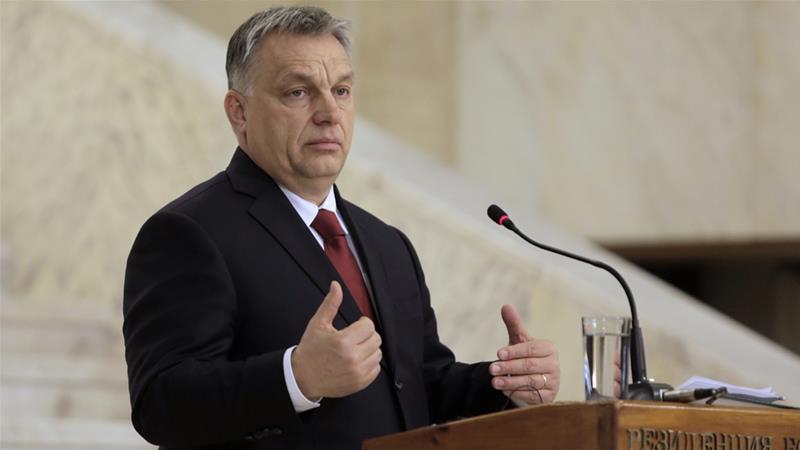Hungary: Groups fear being 'shut down' after Orban win
EU politicians want some of country’s membership rights to be suspended for ‘undermining’ democratic norms.
Following Viktor Orban’s victory in Hungary’s national elections, civil society organisations and observers worry his newly emboldened Fidesz party will use its supermajority to further silence opponents and tighten their grip on the country.
Two days after winning 49 percent of the vote, which secured Fidesz 134 of 199 seats in parliament, Orban, the current prime minister, said his party would push its anti-migration platform by passing previously floated legislation known as the Stop Soros laws.
The legislation, nicknamed after Hungarian-born American billionaire George Soros – who funds the Central European University and Open Society Foundations, proponents of liberal democracy – proposes unprecedented restrictions on human rights groups.
Orban said on Tuesday that the laws had been submitted before the election so voters would know the government’s intentions.
“This has happened, and we believe we are mandated by this election to pass this law,” he said.
Though the law has not been finalised, the proposed incarnation would ban any new foreign-funded non-governmental organisations (NGOs) that “support illegal” immigration and force those already on the ground to pay new taxes.
Causes for concern
Gauri van Gulik, Europe director at Amnesty International, said that requiring NGOs to pay taxes to a government that suppresses the rights of immigrants is a nonstarter that would effectively force groups like Amnesty International to withdraw from the country.
“It is absolutely in the cards that we would be shut down in Hungary, which is an important thing to repeat. Amnesty International could be shut down in a country within the European Union. That’s the potential consequence of this law – so that is what we are dealing with at the moment,” she said.
Another cause for concern came on Thursday when pro-government magazine Figyelo printed the names of more than 200 people it claimed were Soros “mercenaries”, paid to topple Orban’s government and open the country to immigrants.
Those listed included journalists, university professors and members of rights organisations such as Amnesty International and Transparency International.
These recent developments follow an election marred by allegations that the ruling party created an unlevel playing field by misappropriating state funds and resources to support its campaign and systemically eliminating independent voices in the media.
Douglas Wake, head of the election observation mission from the Organization for Security and Cooperation in Europe, told Al Jazeera that it’s not just the “fact that the government is playing a role that we believe crosses a line that is contradicting international standards” on divisions between party and state, but also “undermining the campaign finance regime which should ensure that all campaign financing is transparent”.
Shrinking space
Over recent years, Orban’s allies have acquired numerous media outlets in what critics say is an attempt to control the narrative.
Many independent outlets, cut off from state resources while facing increasing regulations, have closed.
With a third consecutive term now decided, that trend has not slowed after one of Hungary’s oldest and most popular conservative newspapers, Magyar Nemzet, was forced to shut due to financial reasons.
Lanchid Radio, a broadcaster associated with Magyar Nemzet’s parent company, is also slated to close.
Readership in Magyar Nemzet had declined significantly in recent years – down to an average of 13,608 daily copies in the fourth quarter of 2017, roughly one-third of its circulation before February 2015 – but it is owned by Lajos Simicska, a prominent Hungarian businessman and enemy of Orban.
Simicska and Orban had been allies until a public falling-out in 2015 over a new tax. Simicska gave a series of interviews that year in which he hurled obscenities at Orban and promised to remain critical of his government.
“You have to take into consideration that the government spends millions of euros on propaganda against … migrants and asylum-seekers, so people didn’t really have a possibility to have other information,” said Tamas Boros, co-director of the Policy Solutions think-tank.
‘Decline of democracy’
For Boros, the persistant migrant issue – which has made Orban one of the longest-serving rulers in Central Europe – is not an end game, but rather a ploy to pick apart a democratic system that has been in place since the fall of the Soviet Union.
“The most important chapter now is the decline of democracy […] and not how to stop migration,” he said.
With rights groups and observers increasingly worried over Hungary’s future, the European Parliament’s Civil Liberties, Justice and Home Affairs committee on Thursday asked Members of the European Parliament (MEP) to pass sanctions against the Orban government.
“Time and time again, Viktor Orban’s government has undermined the independence of the judiciary, freedom of the press and the fundamental rights of its citizens,” Judith Sargentini, a Dutch Green Party MEP, said in a statement.
“The time for issuing warnings has passed,” she said asking her colleagues to trigger Article 7 of the Treaty on European Union which would suspend certain membership rights Hungary has in the EU.
The imposition of Article 7 would require a unanimous vote from all EU members.
Unlikely outcome
Hungary enjoys close relations with Poland, Slovakia and the Czech Republic, who critics also claim are drifting away from democratic values, making Article 7 an unlikely outcome.
But for many organisations in Hungary, their future may depend on whether the EU is able to carry out such measures.
“I think it is time for the international community especially the EU to take their heads out of the sand and recognise that this is going ahead – and going ahead fast,” said Amnesty’s van Gulik.
“Things are in a different phase, and this is going to require some serious measures be taken.”
The Listening Post
Hungary: Orban’s media manipulation exposed
Source: Read Full Article




